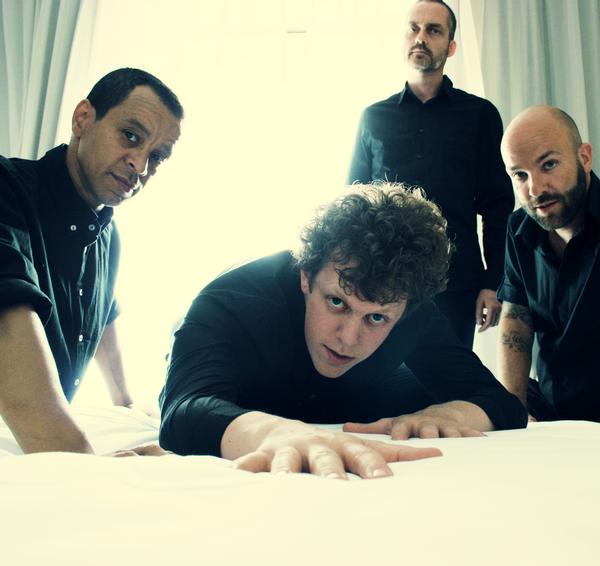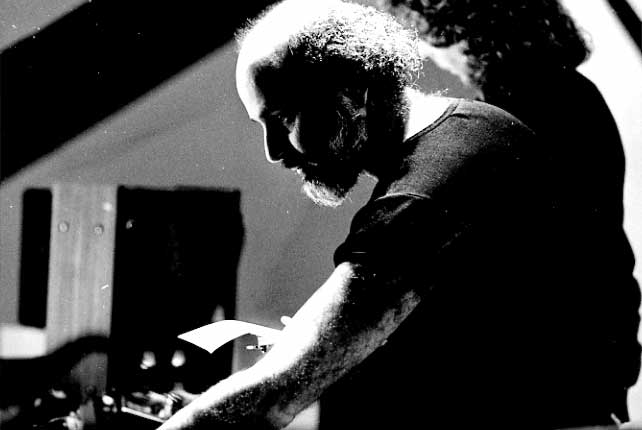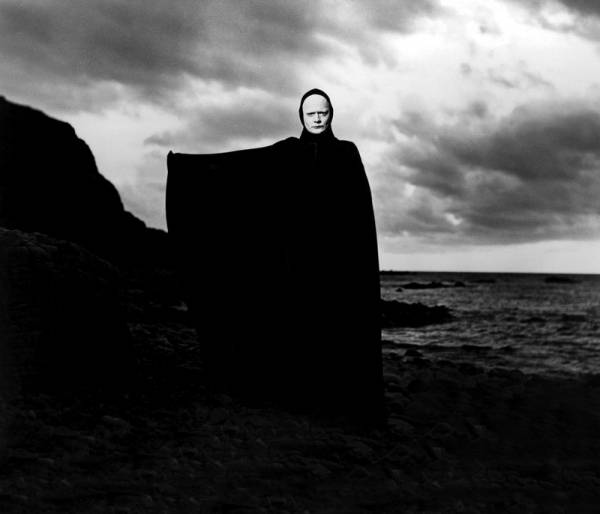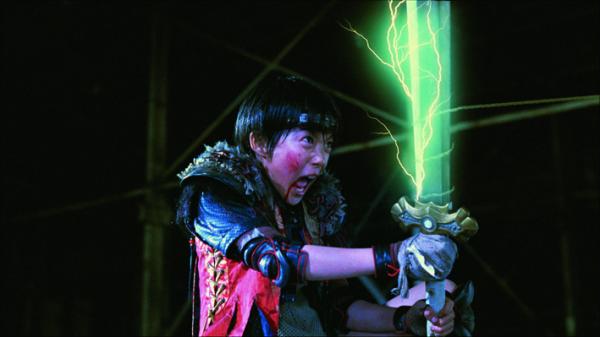
LOVE CRIMES OF KABUL goes inside a women’s prison in Afghanistan to tell a series of fascinating stories
LOVE CRIMES OF KABUL (Tanaz Eshaghian, 2011)
Film Society of Lincoln Center, Walter Reade Theater
165 West 65th St. at Amsterdam Ave.
Monday, June 20, 6:30; Tuesday, June 21, 8:45; Wednesday, June 22, 4:00
Series runs through June 30
212-875-5601
www.filmlinc.com
www.hrw.org
 Iranian-American documentarian Tanaz Eshaghian (I Call Myself Persian, Be Like Others) and cinematographer Kat Patterson gained remarkable access to Afghanistan’s Badam Bagh women’s prison for their fascinating HBO film, Love Crimes of Kabul. Having its U.S. premiere at the twenty-second Human Rights Watch Film Festival, Love Crimes focuses on the intriguing stories of three imprisoned women. Eighteen-year-old Sabereh was arrested after her father turned her in for allegedly having sex with her seventeen-year-old neighbor, Abbas, even though lab reports show she is still a virgin. The twenty-year-old and pregnant Kareema turned in herself and her fiancé, Firuz, in the hopes of forcing him to marry her. And twenty-three-year-old Aleema is in jail because she ran away from her abusive husband and took shelter with Zia and her son, both of whom were arrested as well for attempting to sell her; meanwhile, Zia is trying to convince Aleema to marry her son in order to save them all from shame. Approximately half of the 125 female inmates at Badam Bagh have been incarcerated for either having premarital sex, running away from home, or committing adultery, many of them facing upwards of fifteen to twenty years for their actions. The women are remarkably open and honest, making their own cases to the camera while condemning those of their fellow inmates. Eshaghian captures Kareema speaking to her mother through the prison gates as they discuss the possibility of her father making a financial deal with Firuz and his family. Forty-five-year-old Naseema, the elder spokesperson of the group, proudly talks about having killer her husband, whom she claims deserved it because of his penchant for adultery, including with a seven-year-old girl. And the prison guards regularly defend the laws that essentially make certain kinds of love a crime in Afghanistan. Although she is not allowed into a wedding ceremony or two of the trials, Eshaghian does film one of the trials; she also photographs Firuz’s parents talking to her very directly while in bed, and Aleema holds nothing back when discussing her divorce and her unwillingness to marry Zia’s son, primarily because she claims he couldn’t afford to keep her in the lifestyle she wants. Eshaghian presents the facts and the myriad opinions without embellishment, letting these deeply personal and inherently infuriating stories speak for themselves, revealing a frighteningly old-fashioned society that is doing everything it can to prevent the freedom of women to make their own choices. Part of the “Migrants’ and Women’s Rights” section of the Human Rights Watch Festival, which also includes “Times of Conflict and Responses to Terrorism,” “Human Dignity, Discrimination, and Resources,” and “Truth, Justice, and Accountability,” Love Crimes of Kabul will be shown June 20-22, with all three screenings followed by a discussion with Eshaghian. The festival, which runs through June 30, features nineteen films from twelve countries that deal with human rights issues around the world.
Iranian-American documentarian Tanaz Eshaghian (I Call Myself Persian, Be Like Others) and cinematographer Kat Patterson gained remarkable access to Afghanistan’s Badam Bagh women’s prison for their fascinating HBO film, Love Crimes of Kabul. Having its U.S. premiere at the twenty-second Human Rights Watch Film Festival, Love Crimes focuses on the intriguing stories of three imprisoned women. Eighteen-year-old Sabereh was arrested after her father turned her in for allegedly having sex with her seventeen-year-old neighbor, Abbas, even though lab reports show she is still a virgin. The twenty-year-old and pregnant Kareema turned in herself and her fiancé, Firuz, in the hopes of forcing him to marry her. And twenty-three-year-old Aleema is in jail because she ran away from her abusive husband and took shelter with Zia and her son, both of whom were arrested as well for attempting to sell her; meanwhile, Zia is trying to convince Aleema to marry her son in order to save them all from shame. Approximately half of the 125 female inmates at Badam Bagh have been incarcerated for either having premarital sex, running away from home, or committing adultery, many of them facing upwards of fifteen to twenty years for their actions. The women are remarkably open and honest, making their own cases to the camera while condemning those of their fellow inmates. Eshaghian captures Kareema speaking to her mother through the prison gates as they discuss the possibility of her father making a financial deal with Firuz and his family. Forty-five-year-old Naseema, the elder spokesperson of the group, proudly talks about having killer her husband, whom she claims deserved it because of his penchant for adultery, including with a seven-year-old girl. And the prison guards regularly defend the laws that essentially make certain kinds of love a crime in Afghanistan. Although she is not allowed into a wedding ceremony or two of the trials, Eshaghian does film one of the trials; she also photographs Firuz’s parents talking to her very directly while in bed, and Aleema holds nothing back when discussing her divorce and her unwillingness to marry Zia’s son, primarily because she claims he couldn’t afford to keep her in the lifestyle she wants. Eshaghian presents the facts and the myriad opinions without embellishment, letting these deeply personal and inherently infuriating stories speak for themselves, revealing a frighteningly old-fashioned society that is doing everything it can to prevent the freedom of women to make their own choices. Part of the “Migrants’ and Women’s Rights” section of the Human Rights Watch Festival, which also includes “Times of Conflict and Responses to Terrorism,” “Human Dignity, Discrimination, and Resources,” and “Truth, Justice, and Accountability,” Love Crimes of Kabul will be shown June 20-22, with all three screenings followed by a discussion with Eshaghian. The festival, which runs through June 30, features nineteen films from twelve countries that deal with human rights issues around the world.
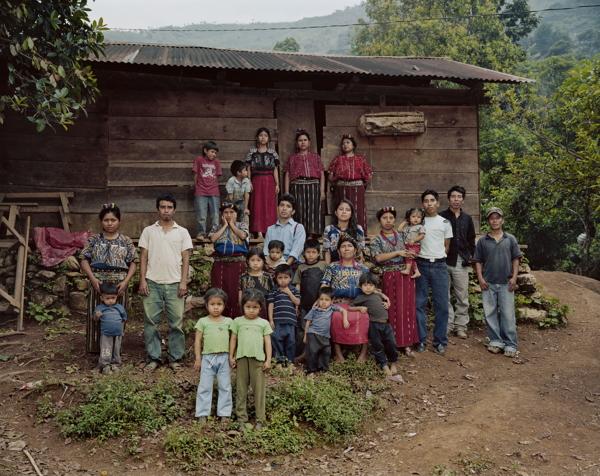
 The opening-night selection of the twenty-second Human Rights Watch Film Festival, Granito: How to Nail a Dictator is an illuminating, if at times overly self-referential, examination of the power of documentary filmmaking. In 1982, Pamela Yates and Newton Thomas Sigel made When the Mountains Tremble, which told the inside story of civilian massacres of the indigenous Maya people as government forces and guerrilla revolutionaries fought in the jungles of Guatemala; one of the film’s subjects, Rigoberta Menchú, became an international figure and went on to win the Nobel Peace Prize. “When I made that film, I had no idea I was filming in the middle of a genocide,” Yates says at the beginning of Granito. A quarter-century after When the Mountains Tremble, Yates was contacted by lawyer Almudena Bernabeu, who asked Yates to comb through her reels and reels of footage to find evidence of the Guatemalan genocide and help bring charges again dictator Ríos Montt, whom Yates had met with back in 1982. In researching the case, Yates speaks with Menchú, forensic archivist Kate Doyle, journalist liaison Naomi Roht-Arriaza, forensic anthropologist Fredy Peccerelli, Spanish national court judge Santiago Pedraz, victims’ rights leader and genocide survivor Antonio Caba Caba, and Gustavo Meoño, a founding member of the Guerrilla Army of the Poor, each of whom sheds light on the proceedings from various different angles, from digging up bones in mass graves to discussing redacted documents that reveal U.S. involvement in Guatemala. Several of them are risking their lives by both continuing to fight the government and appearing on camera. Part of the “Truth, Justice, and Accountability” section of the Human Rights Watch Festival, which also includes “Times of Conflict and Responses to Terrorism,” “Human Dignity, Discrimination, and Resources,” and “Migrants’ and Women’s Rights,” Granito, which Yates directed with Peter Kinoy and Paco de Onís and is her sixth film to be shown at the festival, is a compelling look at how individuals can make a difference. The music is often overly melodramatic, and Yates does seem to like to show herself both in outtakes from her first film and in serious poses in the new film, but its ultimate point overrides those tendencies. Granito will be shown June 17 at 7:00 and June 18 at 1:00; both screenings will be followed by a discussion with the filmmakers as well as subjects Kate Doyle, Alejandra Garcia, and Fredy Peccerelli. The June 17 screening will also be followed by a reception, while the June 18 screening will be followed by a special presentation of When the Mountains Tremble (1982). The festival, which runs June 16-30, features nineteen films from twelve countries that deal with human rights issues around the world. Keep watching twi-ny for further select reviews.
The opening-night selection of the twenty-second Human Rights Watch Film Festival, Granito: How to Nail a Dictator is an illuminating, if at times overly self-referential, examination of the power of documentary filmmaking. In 1982, Pamela Yates and Newton Thomas Sigel made When the Mountains Tremble, which told the inside story of civilian massacres of the indigenous Maya people as government forces and guerrilla revolutionaries fought in the jungles of Guatemala; one of the film’s subjects, Rigoberta Menchú, became an international figure and went on to win the Nobel Peace Prize. “When I made that film, I had no idea I was filming in the middle of a genocide,” Yates says at the beginning of Granito. A quarter-century after When the Mountains Tremble, Yates was contacted by lawyer Almudena Bernabeu, who asked Yates to comb through her reels and reels of footage to find evidence of the Guatemalan genocide and help bring charges again dictator Ríos Montt, whom Yates had met with back in 1982. In researching the case, Yates speaks with Menchú, forensic archivist Kate Doyle, journalist liaison Naomi Roht-Arriaza, forensic anthropologist Fredy Peccerelli, Spanish national court judge Santiago Pedraz, victims’ rights leader and genocide survivor Antonio Caba Caba, and Gustavo Meoño, a founding member of the Guerrilla Army of the Poor, each of whom sheds light on the proceedings from various different angles, from digging up bones in mass graves to discussing redacted documents that reveal U.S. involvement in Guatemala. Several of them are risking their lives by both continuing to fight the government and appearing on camera. Part of the “Truth, Justice, and Accountability” section of the Human Rights Watch Festival, which also includes “Times of Conflict and Responses to Terrorism,” “Human Dignity, Discrimination, and Resources,” and “Migrants’ and Women’s Rights,” Granito, which Yates directed with Peter Kinoy and Paco de Onís and is her sixth film to be shown at the festival, is a compelling look at how individuals can make a difference. The music is often overly melodramatic, and Yates does seem to like to show herself both in outtakes from her first film and in serious poses in the new film, but its ultimate point overrides those tendencies. Granito will be shown June 17 at 7:00 and June 18 at 1:00; both screenings will be followed by a discussion with the filmmakers as well as subjects Kate Doyle, Alejandra Garcia, and Fredy Peccerelli. The June 17 screening will also be followed by a reception, while the June 18 screening will be followed by a special presentation of When the Mountains Tremble (1982). The festival, which runs June 16-30, features nineteen films from twelve countries that deal with human rights issues around the world. Keep watching twi-ny for further select reviews.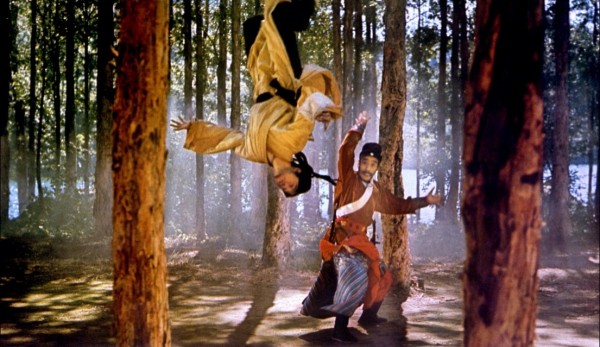
 Watching King Hu’s 1969 wuxia classic, A Touch of Zen, brings us back to the days of couching out with Kung Fu Theater on rainy Saturday afternoons. The highly influential three-hour epic features an impossible-to-figure-out plot, a goofy romance, wicked-cool weaponry, an awesome Buddhist monk, a bloody massacre, and action scenes that clearly involve the overuse of trampolines. Still, it’s great fun, even if it is way too long. (The film, which was initially shown in two parts, earned a special technical prize at the 1975 Cannes Film Festival.) Shih Jun stars as Ku Shen Chai, a local calligrapher and scholar who is extremely curious when the mysterious Ouyang Nin (Tin Peng) suddenly show up in town. It turns out that Ouyang is after Miss Yang (Hsu Feng) to exact “justice” for the corrupt Eunuch Wei, who is out to kill her entire family. Hu (Come Drink with Me, Dragon Gate Inn) fills the film with long, poetic establishing shots of fields and the fort, using herky-jerky camera movements (that might or might not have been done on purpose) and throwing in an ultra-trippy psychedelic mountain scene that is about as 1960s as it gets. A Touch of Zen is ostensibly about Ku’s journey toward enlightenment, but it’s also about so much more, although we’re not completely sure what that is. The film is screening May 15 and May 19 as part of the Film Society of Lincoln Center’s “Taiwan Stories: Classic and Contemporary Film from Taiwan” series, which continues through May 19 with such classic works as Pai Ching-jui’s Home Sweet Home (1970), Li Xing and Li Jia’s Oyster Girl (1964), and Tsai Ming-liang’s Rebels of the Neon God (1992) as well as such more modern films as Doze Niu’s Monga (2008), Chen Wen-tang’s Tears (2009), and Chen Yu-Hsun, Hou Chi-jan, and Shen Ko-Shang’s Juliets (2010).
Watching King Hu’s 1969 wuxia classic, A Touch of Zen, brings us back to the days of couching out with Kung Fu Theater on rainy Saturday afternoons. The highly influential three-hour epic features an impossible-to-figure-out plot, a goofy romance, wicked-cool weaponry, an awesome Buddhist monk, a bloody massacre, and action scenes that clearly involve the overuse of trampolines. Still, it’s great fun, even if it is way too long. (The film, which was initially shown in two parts, earned a special technical prize at the 1975 Cannes Film Festival.) Shih Jun stars as Ku Shen Chai, a local calligrapher and scholar who is extremely curious when the mysterious Ouyang Nin (Tin Peng) suddenly show up in town. It turns out that Ouyang is after Miss Yang (Hsu Feng) to exact “justice” for the corrupt Eunuch Wei, who is out to kill her entire family. Hu (Come Drink with Me, Dragon Gate Inn) fills the film with long, poetic establishing shots of fields and the fort, using herky-jerky camera movements (that might or might not have been done on purpose) and throwing in an ultra-trippy psychedelic mountain scene that is about as 1960s as it gets. A Touch of Zen is ostensibly about Ku’s journey toward enlightenment, but it’s also about so much more, although we’re not completely sure what that is. The film is screening May 15 and May 19 as part of the Film Society of Lincoln Center’s “Taiwan Stories: Classic and Contemporary Film from Taiwan” series, which continues through May 19 with such classic works as Pai Ching-jui’s Home Sweet Home (1970), Li Xing and Li Jia’s Oyster Girl (1964), and Tsai Ming-liang’s Rebels of the Neon God (1992) as well as such more modern films as Doze Niu’s Monga (2008), Chen Wen-tang’s Tears (2009), and Chen Yu-Hsun, Hou Chi-jan, and Shen Ko-Shang’s Juliets (2010).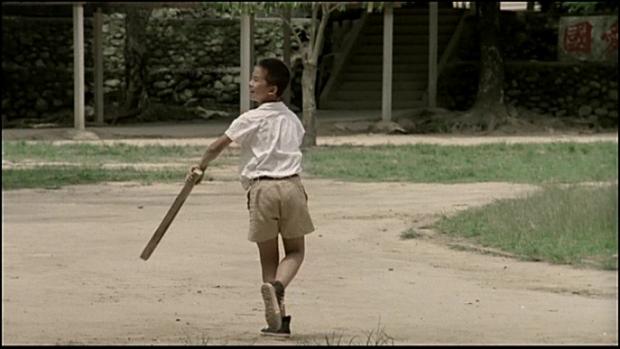
 Hou Hsiao-hsien’s Taiwanese New Wave masterpiece, A Time to Live, a Time to Die, is a bittersweet, nostalgic look back at his childhood, after his father’s government job moves the family from Mainland China just as the Cultural Revolution is taking effect. The semiautobiographical film is seen through the eyes of young Ah-ha (You Anshun) as his father (Tien Feng) suffers ill health, his older brother gets harassed by a local gang, his mother (Mei Fang) tries to maintain the household, and his grandmother (Tang Ju-yun) keeps getting lost, being brought back by rickshaw drivers who demand ever-larger payments. The family lives in a Japanese-style home that is beautifully photographed by cinematographer Mark Lee Ping-bing, with Hou favoring long shots with limited camera movement, calmly shifting from scene to scene as Ah-ha grows up into a teenager (Hsiao Ai) and discovers a whole new set of problems and reality. The middle film in Hou’s coming-of-age trilogy (in between 1984’s A Summer at Grandpa’s and 1986’s Dust in the Wind), A Time to Live is a deeply personal, intimate, unforgettable story of life, death, and the bonds of family. The film is screening May 15 as part of the Film Society of Lincoln Center’s “Taiwan Stories: Classic and Contemporary Film from Taiwan” series, which continues through May 19 and also includes such classic works as Pai Ching-jui’s Home Sweet Home (1970), Li Xing and Li Jia’s Oyster Girl (1964), and King Hu’s A Touch of Zen (1969) as well as such modern films as Doze Niu’s Monga (2008), Chen Wen-tang’s Tears (2009), and Chen Yu-Hsun, Hou Chi-jan, and Shen Ko-Shang’s Juliets (2010).
Hou Hsiao-hsien’s Taiwanese New Wave masterpiece, A Time to Live, a Time to Die, is a bittersweet, nostalgic look back at his childhood, after his father’s government job moves the family from Mainland China just as the Cultural Revolution is taking effect. The semiautobiographical film is seen through the eyes of young Ah-ha (You Anshun) as his father (Tien Feng) suffers ill health, his older brother gets harassed by a local gang, his mother (Mei Fang) tries to maintain the household, and his grandmother (Tang Ju-yun) keeps getting lost, being brought back by rickshaw drivers who demand ever-larger payments. The family lives in a Japanese-style home that is beautifully photographed by cinematographer Mark Lee Ping-bing, with Hou favoring long shots with limited camera movement, calmly shifting from scene to scene as Ah-ha grows up into a teenager (Hsiao Ai) and discovers a whole new set of problems and reality. The middle film in Hou’s coming-of-age trilogy (in between 1984’s A Summer at Grandpa’s and 1986’s Dust in the Wind), A Time to Live is a deeply personal, intimate, unforgettable story of life, death, and the bonds of family. The film is screening May 15 as part of the Film Society of Lincoln Center’s “Taiwan Stories: Classic and Contemporary Film from Taiwan” series, which continues through May 19 and also includes such classic works as Pai Ching-jui’s Home Sweet Home (1970), Li Xing and Li Jia’s Oyster Girl (1964), and King Hu’s A Touch of Zen (1969) as well as such modern films as Doze Niu’s Monga (2008), Chen Wen-tang’s Tears (2009), and Chen Yu-Hsun, Hou Chi-jan, and Shen Ko-Shang’s Juliets (2010).